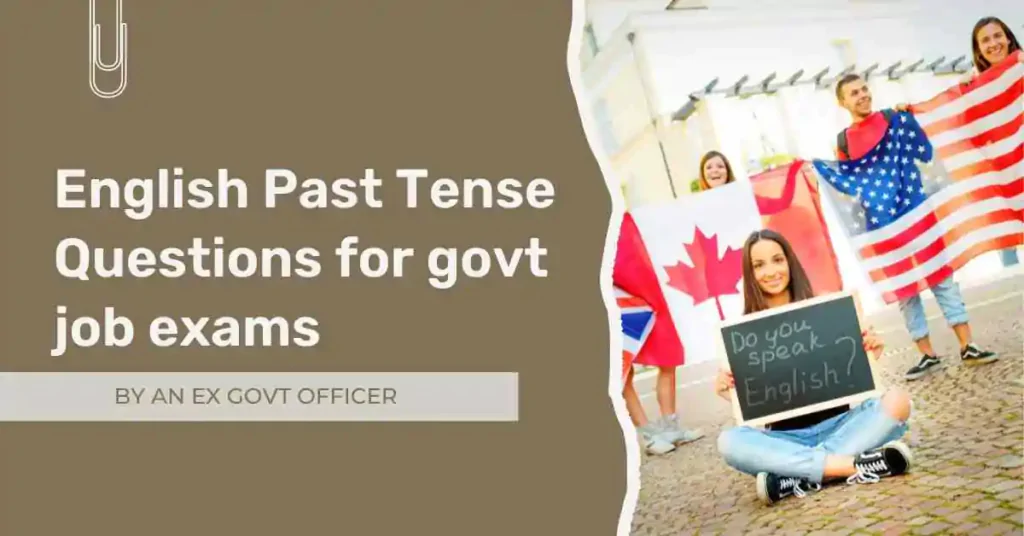English exam is one of the most common exam in Govt job exams. And if you’re preparing for any job especially the lucrative central govt jobs – whether it’s Railways, SSC, UPSC, or State PSC – then you must prepare well for English Exam. Here I’m providing you some easy and some tough MCQ questions to help you understand how’s your preparation going.

Table of Contents
Spot the error test : 20 MCQs
Let’s go:
1) She had went to the store before it closed.
A) She
B) had
C) went
D) before it closed
Ans
Ans: C) went
Explanation: “Went” should be replaced with “gone” to match the past perfect tense structure. The correct sentence should be: “She had gone to the store before it closed.”
2. They was happy with their exam results yesterday.
A) They
B) was
C) happy
D) with their exam results
Ans
Ans: B) was
Explanation: “Was” should be replaced with “were” to agree with the plural subject “They.” The correct sentence should be: “They were happy with their exam results yesterday.”
3. He have finished his homework by the time his friend arrived.
A) He
B) have
C) finished
D) by the time his friend arrived
Ans
Ans: B) have
Explanation: “Have” should be replaced with “had” to correctly form the past perfect tense. The correct sentence should be: “He had finished his homework by the time his friend arrived.”
4. We goes to the museum last summer and saw many interesting exhibits.
A) We
B) goes
C) to the museum
D) last summer
Ans
Ans: B) goes
Explanation: “Goes” should be replaced with “went” to match the past tense indicated by “last summer.” The correct sentence should be: “We went to the museum last summer and saw many interesting exhibits.”
5. She didn’t knew the answer to the question during the quiz.
A) She
B) didn’t
C) knew
D) the answer to the question
Ans
Ans: C) knew
Explanation: “Knew” should be replaced with “know” to correctly use the base form of the verb after “didn’t.” The correct sentence should be: “She didn’t know the answer to the question during the quiz.”
6. They had went to the concert before they met their friends.
A) They
B) had
C) went
D) before they met their friends
Ans
Ans: C) went
Explanation: “Went” should be replaced with “gone” to correctly form the past perfect tense. The correct sentence should be: “They had gone to the concert before they met their friends.”
7. She knew that he had forget his keys at home.
A) She
B) knew
C) had
D) forget
Ans
Ans: D) forget
Explanation: “Forget” should be replaced with “forgot” to match the past perfect tense structure. The correct sentence should be: “She knew that he had forgotten his keys at home.”
8. We was waiting for the bus when it suddenly started to rain.
A) We
B) was
C) waiting
D) when it suddenly started to rain
Ans
Ans: B) was
Explanation: “Was” should be replaced with “were” to agree with the plural subject “We.” The correct sentence should be: “We were waiting for the bus when it suddenly started to rain.”
9. She don’t know that I had left the party early.
A) She
B) don’t
C) know
D) had left the party early
Ans
Ans: B) don’t
Explanation: “Don’t” should be replaced with “didn’t” to match the past tense. The correct sentence should be: “She didn’t know that I had left the party early.”
10. He have wrote a letter to his friend last week.
A) He
B) have
C) wrote
D) to his friend
Ans
Ans: B) have
Explanation: “Have” should be replaced with “had” to form the past perfect tense correctly. Additionally, “wrote” should be replaced with “written.” The correct sentence should be: “He had written a letter to his friend last week.”
11. He said that he didn’t knew where the meeting was being held.
A) said
B) didn’t
C) knew
D) where the meeting was being held
Ans
Ans: C) knew
Explanation: “Knew” should be replaced with “know” to use the base form of the verb after “didn’t.” The correct sentence should be: “He said that he didn’t know where the meeting was being held.”
12. If she had studied harder, she would have passed the test without failing.
A) had studied
B) harder
C) would have
D) without failing
Ans
Ans: D) without failing
Explanation: “Without failing” should be replaced with “without having failed” to correctly reflect the conditional perfect structure. The correct sentence should be: “If she had studied harder, she would have passed the test without having failed.”
13. The committee has concluded their investigation before the new evidence was presented.
A) has
B) concluded
C) their
D) before the new evidence was presented
Ans
Ans: A) has
Explanation: “Has” should be replaced with “had” to correctly use the past perfect tense. The correct sentence should be: “The committee had concluded their investigation before the new evidence was presented.”
14. She would have been surprised if he hadn’t told her about the meeting last month.
A) would have
B) been
C) told
D) about the meeting last month
Ans
Ans: A) would have
Explanation: “Would have” should be replaced with “would be” because the hypothetical situation described is in the past perfect. The correct sentence should be: “She would be surprised if he hadn’t told her about the meeting last month.”
15. The company has implemented the new policy after they received feedback from employees.
A) has implemented
B) the new policy
C) after
D) they received feedback from employees
Ans
Ans: A) has implemented
Explanation: “Has implemented” should be replaced with “had implemented” to correctly place the action before receiving feedback. The correct sentence should be: “The company had implemented the new policy after they received feedback from employees.”
16. By the time I arrived at the party, everyone had already ate their dinner.
A) By the time
B) I arrived
C) had already
D) ate their dinner
Ans
Ans: D) ate their dinner
Explanation: “Ate” should be replaced with “eaten” to correctly use the past perfect tense. The correct sentence should be: “By the time I arrived at the party, everyone had already eaten their dinner.”
17. If they would have known about the traffic, they would have left earlier.
A) would have
B) known
C) about the traffic
D) would have left earlier
Ans
Ans: A) would have
Explanation: “Would have” should be replaced with “had” to correctly form the conditional perfect. The correct sentence should be: “If they had known about the traffic, they would have left earlier.”
18. Had she knew about the opportunity, she would have taken it without hesitation.
A) Had
B) knew
C) about the opportunity
D) would have taken it without hesitation
Ans
Ans: B) knew
Explanation: “Knew” should be replaced with “known” to correctly form the past perfect conditional structure. The correct sentence should be: “Had she known about the opportunity, she would have taken it without hesitation.”
19. Despite they had warned him about the risks, he proceeded with the plan.
A) Despite
B) they had warned
C) him about the risks
D) proceeded with the plan
Ans
Ans: B) they had warned
Explanation: “They had warned” should be replaced with “having warned” to correctly use the past perfect participle in this context. The correct sentence should be: “Despite having warned him about the risks, he proceeded with the plan.”
20. The manager was relieved that the report had been finished on time, even though several errors were found in it.
A) was relieved
B) that the report had been finished
C) on time
D) even though several errors were found in it
Ans
Ans: B) that the report had been finished
Explanation: “That the report had been finished” should be replaced with “that the report was finished” because the reporting of the state of completion should be in the simple past tense here. The correct sentence should be: “The manager was relieved that the report was finished on time, even though several errors were found in it.”
Understand the Past Tense
Let’s understand the past tense and how question can be solved easily. The past tense is used to describe actions or states that occurred at a specific time in the past. Very often questions are asked using the irregular verbs.
How to recognize past tense?
Pay attention to words and phrases like “yesterday,” “last year,” “ago,” and specific dates are often used with the past tense to indicate when an action occurred. Very often regular verbs take the form of +ed (e.g., “talk” becomes “talked”), while irregular verbs take a unique past forms that need to be memorized (e.g., “go” becomes “went”). The four types past tenses are described below:
1. Simple Past Tense
- Use: To describe completed actions that happened at a specific time in the past.
- Example: “I visited Paris last summer.”
- Explanation: The action of visiting Paris is completed and happened at a specific time (last summer).
- Form: [Verb + -ed] for regular verbs (e.g., “walked,” “played”), and irregular forms for irregular verbs (e.g., “went,” “saw”).
2. Past Continuous Tense
- Form: [Was/Were + Verb + -ing]
- Explanation: This tense is used to describe an ongoing action that was happening at a particular moment in the past. It often sets the scene for another action that occurred.
- Example: “She was reading a book when the phone rang.”
3. Past Perfect Tense
- Form: [Had + Past Participle]
- Explanation: The past perfect tense is used to describe an action that was completed before another action in the past. It helps to establish a sequence of events.
- Example: “They had already left when I arrived.”
4. Past Perfect Continuous Tense
- Form: [Had been + Verb + -ing]
- Example: “She had been studying for hours before the test started.”
- Explanation: This tense describes an ongoing action that was happening up until a certain point in the past. It emphasizes the duration or continuous nature of the action.









